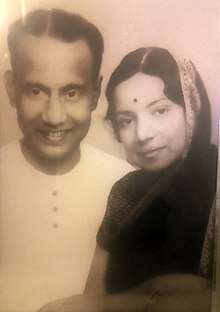Malati Ghoshal
Malati Ghoshal (née Bose) (Bengali: মালতী ঘোষাল) (17 December 1902 – 17 July 1984) was an Indian Rabindra Sangeet singer.[1]
Malati Ghoshal মালতী ঘোষাল8 | |
|---|---|
 Malati Ghosal with her husband, Dr. S C Ghosal | |
| Born | 17 December 1902 |
| Died | 17 July 1984 (aged 81) |
| Nationality | Indian |
| Occupation | vocalist |
| Years active | 1940-52 |
| Known for | Rabindra Sangeet singer |
| Children | Aloka Mitra |
| Parents |
|
Career
Malati Ghoshal was born in Kolkata to Hemendra Mohan Bose, a leading Swadeshi entrepreneur in Bengal, and Mrinalini Bose who was the sister of Upendrakishore Roy Chowdhury.[2] She learnt Tappa from Manada Sundari Dasi, Kirtan from Purnakumari Dasi, Indian Classical Music from Gopeshwar Bandyopadhyay, Surendranath Bandyopadhyay and Shyam Sundar Mitra.[2] She also played Sitar well.[2]
She became a well known exponent of Rabindrasangeet, having sung directly for Rabindranath Tagore along with her contemporaries Amiya and Amita Tagore.
She was married to Dr. Sushanta Chandra Ghoshal in 1935. Dr Ghoshal was a noted microbiologist and Head of the School of Tropical Medicine in Calcutta, and had worked on the deadly diseases kala azar and cholera with the likes of Dr UN Bramhachari. He was also a proficient singer who supported and encouraged her singing talent.[2]
She comes from an eminent family of Brahmo Samaj and performed at Brahmo ceremonies.[2] She used to sing duets with her husband also.
Her first gramophone record, containing two Tagore Songs, "Ke Bosile Aji" and "Hridayo Basona Purno Holo", was released in 1940.[2] Her second gramophone record, containing two other Tagore Songs, "E Parabase Rabe Ke" and "Jodi E Amaro Hridayo Duaro", was released in 1950.[2] These four songs made her very popular in those days.[2] During the Tagore centenary celebrations of 1961, she released her third disc (both songs duets with Ramesh Bandyopadhyay) with the songs "Anondodhwoni Jagao Gogone" and "Sokolkolushotamosohor".
She lost her husband in 1952 and after that she gave up singing. She is survived by a daughter, Aloka Mitra.[2] and grandchildren.
References
- "A singer's tribute". Business Standard. 5 February 2011.
- Sengupta, Subodh Chandra, ed. (2002) [1976]. Samsad Bangali Charitabhidhan (in Bengali). I. Bose, Anjali (4th ed.). Kolkata: Sahitya Samsad Pvt Ltd. pp. 416–17. ISBN 81-86806-98-9.
External links
- Malati Ghosal sings on YouTube
- Malati Ghosal at last.fm
- Malati Ghoshal sings Aaji Hridayasane on YouTube
- Swarnalatha at www.lakshmansruthi.com